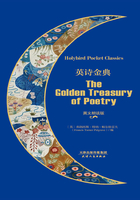
第2章 PREFACE(1)
This little Collection differs, it is believed, from others in the attempt made to include in it all the best original Lyrical pieces and Songs in our language, by writers not living, —and none beside the best. Many familiar verses will hence be met with; many also which should be familiar: —the Editor will regard as his fttest readers those who love Poetry so well, that he can offer them nothing not already known and valued.For those who take up the book in a serious and scholarly spirit, the following remarks on the plan and the execution are added.
The Editor is acquainted with no strict and exhaustive definition of Lyrical Poetry; but he has found the task of practical decision increase in clearness and in facility as he advanced with the work, whilst keeping in view a few simple principles. Lyrical has been here held essentially to imply that each Poem shall turn on some single thought, feeling, or situation.In accordance with this, narrative, deive, and didactic poems, —unless accompanied by rapidity of movement, brevity, and the colouring of human passion, —have been excluded.Humorous poetry, except in the very unfrequent instances where a truly poetical tone pervades the whole, with what is strictly personal, occasional, and religious, has been considered foreign to the idea of the book.Blank verse and the ten-syllable couplet, with all pieces markedly dramatic, have been rejected as alien from what is commonly understood by Song, and rarely conforming to Lyrical conditions in treatment.But it is not anticipated, nor is it possible, that all readers shall think the line accurately drawn.Some poems, as Gray's Elegy, the Allegro and Penseroso, Wordsworth's Ruth or Campbell's Lord Ullin, might be claimed with perhaps equal justice for a narrative or deive selection: whilst with reference especially to Ballads and Sonnets, the Editor can only state that he has taken his utmost pains to decide without caprice or partiality.
This also is all he can plead in regard to a point even more liable to question; —what degree of merit should give rank among the Best. That a Poem shall be worthy of the writer's genius, —that it shall reach a perfection commensurate with its aim, —that we should require fnish in proportion to brevity, —that passion, colour, and originality cannot atone for serious imperfections in clearness, unity, or truth, —that a few good lines do not make a good poem, —that popular estimate is serviceable as a guidepost more than as a compass, —above all, that Excellence should be looked for rather in the Whole than in the Parts, —such and other such canons have been always steadily regarded.He may however add that the pieces chosen, and a far larger number rejected, have been carefully and repeatedly considered; and that he has been aided throughout by two friends of independent and exercised judgment, besides the distinguished person addressed in the Dedication.It is hoped that by this procedure the volume has been freed from that one-sidedness which must beset individual decisions: —but for the fnal choice the Editor is alone responsible.